Sleep troubles plague many, with only 49% of adults feeling they get enough sleep and 80% desiring better quality. In Australia, sleep disorders affect nearly half of all adults and a significant portion of teenagers.
This epidemic leads to 37.9% of adults falling asleep unintentionally during the day and many suffering from various forms of insomnia, despite trying traditional remedies like reading or soothing music.
A promising, natural alternative is emerging: mushrooms. This article will explore the best mushrooms for sleep, potentially unlocking the key to restful slumber.
6 of The Best Mushrooms for Sleep
Let's explore the top six mushrooms renowned for their sleep-enhancing properties:
1. Cordyceps: Regulating Circadian Rhythms

Cordyceps are renowned for their energy-boosting properties and ability to regulate circadian rhythms. They're often used to enhance athletic performance and increase overall vitality, which in turn, aids in normalizing sleep patterns.
Studies show that these mushrooms have the following nutritional components for that aid with sleep:
- Rich in antioxidants and B vitamins, crucial for maintaining energy balance.
- Contains adaptogenic properties, helping the body cope with stress and thereby improving sleep quality.
Why Cordyceps are Important for Sleep:
- Supports the stabilization of circadian rhythms, ensuring a natural and healthy sleep-wake cycle.
- Enhances non-REM sleep, which is critical for physical restoration and recovery.
- They have reduced glutamine and acetylcholine levels. This is important as it helps to improve deep sleep and prevent unwanted wakefulness.
2. Reishi Mushrooms: The Superhero of Non-REM Sleep
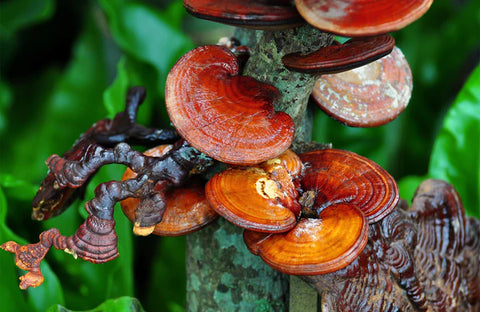
Reishi mushrooms are valued for their calming effects and ability to promote relaxation and deeper sleep. They're also used for immune support and stress reduction.
You might wonder, do they have any nutritional components for sleep?
Yes they do!
- They are high in triterpenoids and polysaccharides, which are known for their sedative effects.
- They contain natural compounds that help reduce stress and anxiety, leading to better sleep.
Why Reishi Mushrooms are Important for Sleep:
- They’re vital in enhancing the quality and duration of non-REM sleep, essential for mental and physical rejuvenation.
- They help in reducing sleep disturbances, promoting a more restful sleep.
3. Lion’s Mane: Not Just for Focus

Lion’s Mane supports cognitive function and nerve health. It's used for its neuroprotective properties and potential to alleviate mild symptoms of anxiety and depression, which can interfere with sleep.
When it comes to nutritional components for sleep, Lion’s Mane mushrooms:
- Contain hericenones and erinacines, compounds that promote brain health and may aid in sleep regulation.
- Rich in antioxidants and polysaccharides, supporting overall brain health.
Why Lion’s Mane Mushrooms are Important for Sleep:
- May improve sleep quality by reducing anxiety and promoting mental relaxation.
- Supports overall cognitive health, which is linked to better sleep patterns.
4. Chaga
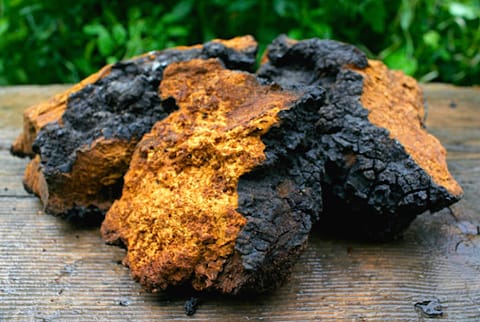
Chaga mushrooms are known for their high antioxidant content. They support immune health and can help reduce inflammation, indirectly aiding in sleep improvement.
The feature on our list for the best mushrooms for sleep because they:
- Contain antioxidants and polysaccharides, which reduce stress and inflammation.
- Rich in melanin and beta-glucans, promoting overall well-being.
Why Chaga Mushrooms are Important for Sleep:
- Indirectly supports sleep quality through stress and inflammation reduction.
- Contributes to general health, which is conducive to better sleep.
5. Turkey Tail
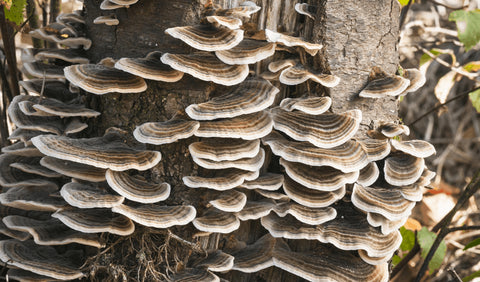
Turkey Tail mushrooms are primarily known for their immune-boosting properties. They also support gut health, which is closely linked to sleep quality.
These mushrooms have:
- High in polysaccharides and beta-glucans, known for supporting the immune system.
- Antioxidants that help maintain overall health.
Why Turkey Tail Mushrooms are Important for Sleep:
- Supports overall health and well-being, indirectly leading to improved sleep.
- Balances immune response, which can positively affect sleep patterns.
6. Psilocybin Mushrooms
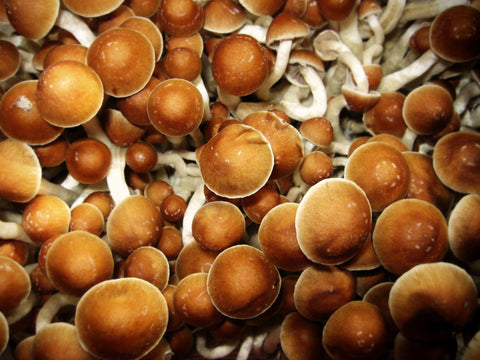
Psilocybin mushrooms are studied for their potential effects on mental health, particularly in reducing anxiety and depression, which can improve sleep quality.
They’ve been found to:
- Contains psilocybin, which influences serotonin receptors in the brain.
- May have adaptogenic properties that help in stress management.
Why Psilocybin Mushrooms are Important for Sleep:
- Potential to influence serotonin levels, impacting sleep patterns.
- May have a calming effect on the mind, leading to improved sleep quality (Note: Use is subject to legal restrictions and should only be considered under professional guidance).
- They have also shown potential in mood regulation. Improved mood and emotional well-being are crucial for good sleep quality.
How These Mushrooms Work
Mushrooms used for sleep improvement possess unique properties and compounds that interact with the body in various ways to promote restful sleep.
Here's an overview of how these mushrooms work:
- Adaptogenic Properties: Many of these mushrooms, like Cordyceps and Reishi, are adaptogens. Adaptogens help the body manage stress more effectively. By reducing stress and anxiety, these mushrooms create a more conducive environment for sleep. Lower stress levels mean the body can relax easier, paving the way for a smoother transition into sleep.
- Regulation of Circadian Rhythms: Certain mushrooms, particularly Cordyceps, have properties that help in stabilizing the body’s natural sleep-wake cycle, known as the circadian rhythm. This regulation is crucial for maintaining consistent and healthy sleep patterns, making it easier to fall asleep and wake up naturally.
- Enhancement of Non-REM Sleep: Reishi mushrooms, for instance, are particularly effective in enhancing the quality and duration of non-REM (Rapid Eye Movement) sleep. Non-REM sleep is a deep sleep phase essential for physical and mental restoration. By improving non-REM sleep, these mushrooms aid in ensuring that the sleep is genuinely restorative.
- Neuroprotective and Cognitive Benefits: Lion’s Mane is known for its neuroprotective properties. It supports brain health, which plays a vital role in regulating sleep patterns. Improved cognitive function can also contribute to better management of factors like anxiety and stress, which often interfere with sleep.
- Antioxidant and Anti-inflammatory Effects: Mushrooms like Chaga offer high antioxidant content, which combats oxidative stress in the body. Reducing inflammation and oxidative stress can lead to an overall improvement in health, thereby indirectly supporting better sleep quality.
- Influence on Serotonin Receptors: Psilocybin mushrooms interact with serotonin receptors in the brain. Serotonin is a key neurotransmitter that influences mood and sleep. While the use of psilocybin mushrooms is subject to legal restrictions and should be approached with caution, their impact on serotonin suggests a potential role in sleep regulation.
Mushroom-Based Products for Sleep
1. Mushroom Gummies

Mushroom Gummies are an innovative and enjoyable way to consume the benefits of medicinal mushrooms.
These gummies often combine the sleep-enhancing properties of mushrooms like Reishi, Lion’s Mane, or Cordyceps with delightful flavors, making them a pleasant addition to your nighttime routine.
They are ideal for those who prefer not to swallow pills or dislike the taste of mushrooms.
2. Mushroom Tinctures
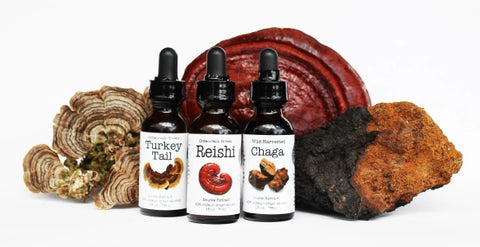
Mushroom Tinctures are concentrated liquid extracts that offer a potent dose of medicinal mushrooms’ benefits.
These tinctures typically come in small bottles with droppers, making it easy to control and customize the dosage.
Tinctures are known for their rapid absorption rate, as the liquid form allows the active components to enter the bloodstream quickly.
Ideal for those seeking quick effects, tinctures can be added to drinks like tea or water or taken directly under the tongue.
3. Mushroom Powders
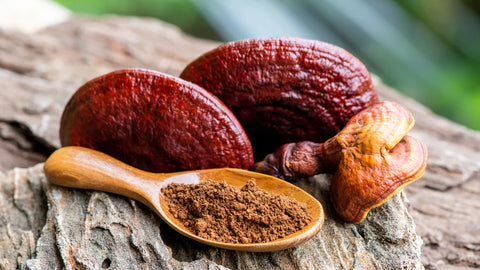
Mushroom Powders offer versatility and are great for integrating medicinal mushrooms into your daily diet.
These powders can be easily mixed into smoothies, shakes, soups, or even baked goods. They are ideal for individuals who regularly consume protein shakes or smoothies and want to add a nutritional boost without changing their habits significantly.
When selecting mushroom powders, ensure they are made from the fruiting bodies of the mushrooms for maximum efficacy and are free from fillers or additives.
Want to make mushroom powder on your own, here's an article to guide you through the steps for making mushroom powder at home.
4. Mushroom Capsules

Mushroom Capsules are a convenient and straightforward way to take medicinal mushrooms. They are perfect for those who prefer a no-fuss, consistent dosage each day.
Capsules often contain a precise amount of mushroom extract, ensuring you get a consistent dose every time.
They are suited for people with busy lifestyles who appreciate the convenience of a supplement that can be quickly taken with water.
5. Functional Mushroom Chocolates

Functional Mushroom Chocolates combine the health benefits of mushrooms with the indulgence of chocolate.
These chocolates are typically infused with extracts of mushrooms like Reishi or Chaga, known for their sleep-enhancing properties. They offer a unique and pleasurable way to consume medicinal mushrooms, especially for those who have a sweet tooth.
6. Mushroom Infused Teas and Coffees

Mushroom Infused Teas and Coffees are an excellent way for tea and coffee enthusiasts to enjoy the benefits of medicinal mushrooms. These beverages usually incorporate mushroom extracts in a way that complements the flavor of the tea or coffee.
Look for products that use organic coffee or tea leaves and high-quality mushroom extracts. Some may include adaptogenic herbs for additional benefits. These beverages are suitable for those who want to integrate the benefits of mushrooms into their existing routine effortlessly.
Tips and Precautions When Using Mushrooms for Sleep
While mushrooms offer a natural approach to better sleep, it is important to exercise caution and consider a few tips before incorporating them into your sleep routine:
- Consult with a Healthcare Professional: If you are currently taking prescription sleep medications or any other medications, it's always advisable to consult with a healthcare professional before incorporating mushroom supplements into your routine. They can provide guidance based on your specific health circumstances.
- Personalize Your Approach: Not everyone responds to mushrooms in the same way. It may take some experimentation to find the best mushroom supplement and dosage that works for you. Pay attention to how each mushroom affects your sleep and make adjustments accordingly.
- Timing Matters: Consider the timing of your mushroom intake. For example, if reishi mushrooms make you feel drowsy, it's best to take them closer to bedtime. On the other hand, lion's mane might make you feel more alert, so it's better to take it earlier in the day.
- Choose High-Quality Supplements: Ensure that you source high-quality mushroom supplements from reputable manufacturers. Look for supplements that undergo rigorous testing and are free from contaminants.
- Combine with Healthy Sleep Habits: Mushrooms alone cannot replace healthy sleep habits. It's important to establish a conducive sleep environment, maintain a consistent sleep schedule, limit exposure to blue light before bed, and practice relaxation techniques to optimize your sleep quality.
Conclusion
Medicinal mushrooms offer a natural and holistic approach to enhancing sleep quality. From the adaptogenic properties of Cordyceps to the calming effects of Reishi, each mushroom brings unique benefits to the table.
Whether you choose gummies, tinctures, powders, capsules, chocolates, or infused teas and coffees, there's a mushroom-based product to suit every preference.
Integrating these fungi into your daily routine can not only improve your sleep but also contribute to overall health and well-being.
Remember to consult with a healthcare provider before starting any new supplement regimen.



















